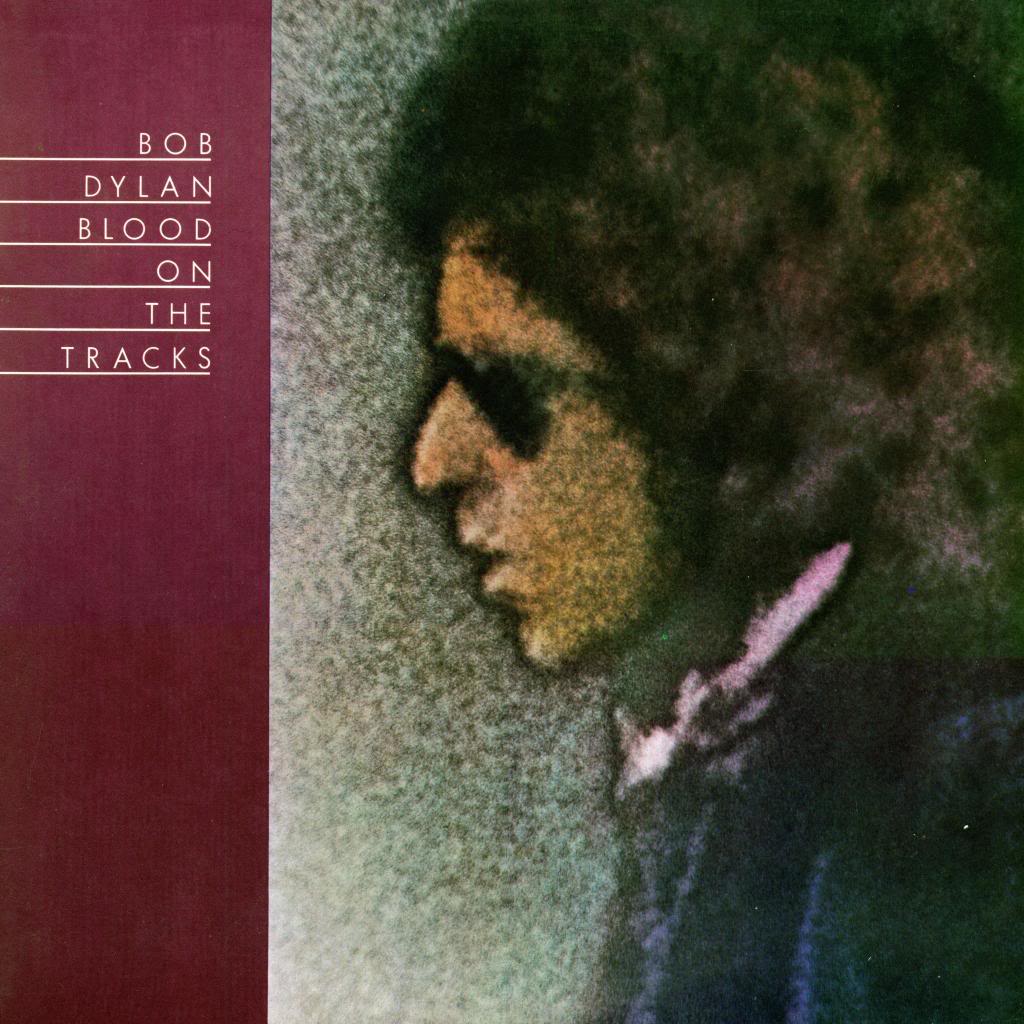Blood On The Tracks is that rare thing, an album that deserves every word of praise heaped upon it. At this stage in his career Bob Dylan had done his best to shake off the oh-so cliched ‘voice of a generation’ tag. His mid 60s electric trilogy had been rightly celebrated, but it had made him a near mythical figure, something which, in retrospect, Dylan himself was more than a little uncomfortable about. A motorbike accident, a rootsy comeback, some careful career deconstruction, another break, soundtrack work, a reasonably well received album and tour with The Band later and suddenly the pressure was off him a little. Dylan disciples such as Neil Young and Joni Mitchell had enjoyed huge success over the last five years, so the focus was temporarily off the former Mr Zimmerman.
As well-received as his recent material had been, long time Dylan followers had started to wonder if he would ever again reach the creative heights he had in the mid 60s. Released in early 1975, Blood On The Tracks didn’t just reach these heights, it comprehensively exceeded them. Yes, it’s his divorce album. Yes, some people do prefer the alternative versions which eventually surfaced on the bracing Bootleg Series to some of the songs here. But it’s also the finest album Bob Dylan put his name to, and arguably the finest album ever released.
So why do I hold that opinion? It’s because of all of Dylan’s work, Blood on the Tracks contains the highest concentration of his songs that I can relate to. I may not have experienced everything that Dylan sings about here, but I can relate to it and compare it to my own life experiences in such a way that it affects me in a manner that few albums do. With the brilliant “Tangled Up In Blue” Dylan paints an effective 3D diorama of how a relationship I almost found myself in during my dating days could have panned out. The girl that made me lonely when she went? Yeah she’s here too. The female friend that offered me “Shelter From The Storm”? Present and correct. Hell, there’s even a girl I want you to say hello to should you see her. With Blood On The Tracks there’s a song for every rush of lust, every inevitable heartbreak, every corkscrew to the heart. Most of all though, there’s “Idiot Wind”, a song which expresses every feeling I’ve ever had about a relationship that failed when I was at my most impressionable that still has repercussions that choose to rumble through my subconsciousness at the most inopportune times. As much as she went out of her way to hurt and humiliate me, I still feel at least partly to blame.
Because of this, not only is Blood On The Tracks my favourite Bob Dylan album, but it may very well be my favourite album of all time. It has the power to simultaneously lift my spirits and make me break down in tears and as I make my way through life and experience what the world has to offer, it travels with me ageless and utterly dependable, when so much around me inevitably crumbles. It’s production still zings with a freshness that many of Dylan’s albums have lacked, Dylan himself actually sings rather than croaks, the whole album sounds absolutely natural and organic and it’s perfectly well balanced and considered to the point where you simply can’t imagine a single song being omitted without it altering the whole dynamic of the album. It must take an immense amount of willpower to omit a song as mind-boggling brilliant as “Up to Me” from an album, but really, there’s no where on Blood On The Tracks it would have fit without it sounding forced in and changing how you hear the album. Like I said, perfectly well balanced and considered.
Bob Dylan has gone on record as struggling to understand why anyone would enjoy the heartbreak on Blood on the Tracks. Personally, it’s because I feel I can superimpose my own life experiences over the music and lyrics. I think that’s why many people have such an attachment to certain albums and even individual songs, it’s that ‘this song is about me’ thing. Except Blood on the Tracks isn’t about me. Dylan has admitted that much of the album isn’t even autobiographical. Instead it’s a case study of heartbreak, rejection, chances missed because you’re frozen by fear, crushed souls, and yet somehow nurturing that tiniest shred of optimism that love isn’t going to pass you by, so you just keep looking for that one person who is going to make everything better.
There’s a reason that when any songwriter releases an album detailing heartbreak and love gone awry that it’s often considered their Blood on the Tracks, it’s because no one has ever done it better than Bob Dylan and chances are, no one ever will.














No Comment